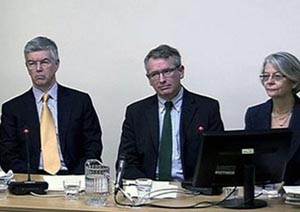
LONDON (UK Press Association / Pacific Media Watch): There is an abundance of "idealistic" people keen to enter journalism but the culture of newsrooms puts them under great ethical pressures, media academics have suggested.
While journalism students are generally taught ethics, they fear losing their jobs if they refuse to go along with what is expected of them once they enter newspapers, the Leveson Inquiry into press standards heard.
Giving evidence, Professor Steven Barnett from the University of Westminster said: "There's an abundance of people who are keen, eager, quite idealistic about their view of what journalism can do, what they can achieve as journalists, the role of journalism in a democratic society."
But instilling "moral courage" in journalism students for when they enter the workplace is a problem, he acknowledged.
"They're told in no uncertain terms that if they don't do what they're asked to do there's no shortage of young, willing recruits waiting to take up the very valued and rare job that they have," he said.
"I'm talking specifically now about the kinds of national tabloid newspapers where a lot of these problems have occurred."
Those kinds of pressures were not "something we can actually teach someone to deal with", he suggested.
'Constant pressure'
Angela Phillips, who runs the print journalism programmes at Goldsmiths, University of London, and gave evidence alongside Prof Barnett, said the university's courses taught students to be ethical, "knowing they're going to be going into an industry where they're under constant pressure".
She claimed that some journalists "get trapped" working for tabloids as they pay more than other newspapers, and "kind of go with it" for financial reasons.
The academics, joined by head of journalism at City University London Professor George Brock and Professor Brian Cathcart of Kingston University, London, offered a lukewarm assessment of the National Council for the Training of Journalists (NCTJ), with Prof Cathcart noting that "it's a small corner of the NCTJ diploma that addresses ethical questions".
This was perhaps a reflection of the training body being "the servant of the industry, and the industry's priorities not being highly ethical", he suggested.
(cc) Creative Commons



